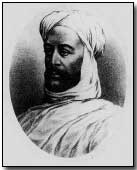Feature Articles - The Most Popular War in History - Charles 'Chinese' Gordon
 General Charles 'Chinese' Gordon (1833-1885)
General Charles 'Chinese' Gordon (1833-1885)
In my father's words, 'God, Empire and Charles Gordon made a powerful trinity' (At Duty's Call, p50). Most famous for his death at Khartoum fighting (as he would see them) the infidel, General Gordon epitomised many of the heroic qualities admired in Britain up until the Great War (and probably for a while afterwards).
He was a puritanical Evangelical Christian and first came to prominence on account of his adventures in China. There he led Chinese troops to extraordinary exploits during the Taiping Rebellion of the 1860's by transforming a peasant guerrilla army into a disciplined fighting force. He acquired the nickname 'Chinese' Gordon as a consequence.
What was remarkable - and also widely admired - was his ability to assert command first over non-European races by sheer force of personality - the spirit that helped build the British Empire at its most spectacular. Arguably the whole of British rule in India was based on force of personality. 1100 civil servants, 75,000 British troops and a thousand or so other officials managed the whole subcontinent (see main article).
 By
1884 Gladstone was in power, and Liberal policy in Imperial matters was
distinguished by caution and, many would say, level-headed good sense.
When the Sudan erupted under the 'Mahdi', General Gordon was requested by
the Khedive of Egypt to supervise Egyptian withdrawal from the Sudan back to
Egypt.
By
1884 Gladstone was in power, and Liberal policy in Imperial matters was
distinguished by caution and, many would say, level-headed good sense.
When the Sudan erupted under the 'Mahdi', General Gordon was requested by
the Khedive of Egypt to supervise Egyptian withdrawal from the Sudan back to
Egypt.
However instead of obeying orders he installed himself at Khartoum, effectively blackmailing the British Government into sending troops into the Sudan to relieve him. By this time he was already seen as an ideal Christian warrior, so that very soon great pressure would be brought on the Government to lift the Mahdi's siege.
The picture of the embattled Christian hero and idealist fighting against the hordes of the infidel would be remembered for a long time, and reflect very badly on Gladstone and the Liberal Government when Gordon was killed. As Sir William Butler (quoted by my father) remarked: 'The picture of a wonderful life had to be made perfect by heroic death'.
The siege was lifted - two days too late, something which many people put down to Gladstone's disastrous shilly-shallying. (The fact that General Gordon had disobeyed an expressly-given order - effectively committing mutiny - to evacuate both Khartoum and the Sudan seemed to have been forgotten).
Gordon had been shot during street fighting in Khartoum as the Mahdi's forces, armed with modern weapons taken from the British on a previous occasion, overwhelmed the defenders. Interestingly his death was against the express wish of the Mahdi, who, it seems, would have liked to have met General Gordon. Given that both of them were, in their way, certain that God was on their side, living in worlds of religious absolutes and hostile to the development of modern, secular society, they might have had more in common than you would expect.
Bibliography:
1. Reader W J (1988) At Duty's Call - A Study in Obsolete Patriotism, Manchester University Press
2. The Daily Telegraph publication (1997): The British Empire, Telegraph Group Ltd., Canary Wharf, London E14 5DT
Picture Credits:
Photographs from The British Empire, Daily Telegraph Publications 1997.
Click here to view the main article
Article and photographs contributed by Humphrey Reader.
A 'Woolly Bear' comprised a German shrapnel shell, which burst with a cloud-like explosion.
- Did you know?
